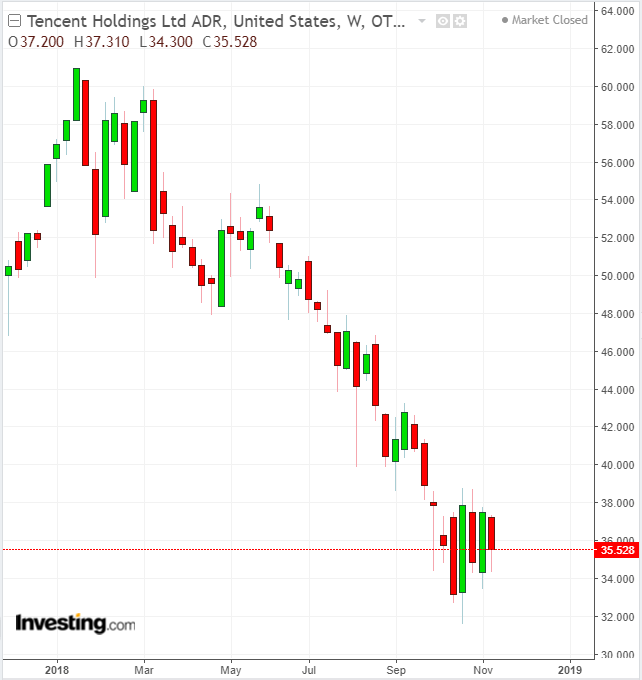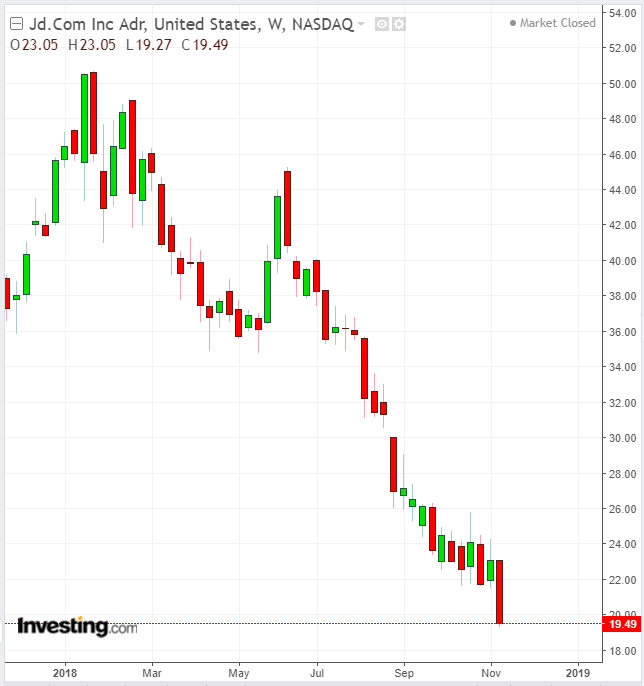Shares of Tencent Holdings (OTC:TCEHY) and JD.com (NASDAQ:JD), China’s two leading internet companies, have both stumbled during 2018. To be sure, each company is facing its own unique set of challenges, but based on the shrinking value of their stocks, it would appear the outcome for both will likely be similar in direction.
Each stock has gone through steep declines this year, with no sign of a turnaround on the horizon. Though the recent slump in Chinese stocks is widespread and in line with the global trend, these two giants are also facing unique challenges clouding their individual future business outlooks.
Below we take a deeper look at what’s affecting each company, to see whether their recently released earning reports provide any bright spots.
Tencent: Gaming Business Challenged

This Shenzhen-based social media giant is struggling to maintain its growth momentum, at a time when its principal source of revenue is under pressure.
Ever since the spring, when Chinese regulators choked off the country’s pipeline of video games amid concerns about game addiction, investors have started questioning the sustainability of the torrid growth pace previously displayed by 'the Facebook of China.' Still, during its latest earnings release, Tencent was able to show hefty profits for the third quarter, helped by advertising sales and investment gains.
Unfortunately, that wasn’t enough to arrest the slump in its shares which were mostly fueled by investment gains that weren't enough to obscure the slowdown in the company's crucial gaming segment forecast for the next quarter. Tencent said on November 15th it had posted net income of 23.3 billion yuan ($3.35 billion) for the three months ended September 30, beating analyst expectations. Revenue rose 24% to 80.6 billion yuan, in line with forecasts.
Profit for the period included 8.8 billion yuan ($1.27 billion) from the initial public offering of Meituan Dianping (HK:3690), the food and delivery company backed by Tencent. That was more than twice what Tencent booked in investment gains in last year’s third quarter.
These impressive bottom-line numbers, however, don’t solve the gaming challenge Tencent is facing. The company relies on new games to bring in and retain users on its WeChat messaging service, over which it sells in-game items and advertising to a billion-plus potential customers.
During the Q3 earnings announcement, the company didn’t mention the government’s freeze on videogame approvals in its prepared remarks. However, in response to an analyst's question, Tencent President, Martin Lau, said, “we are waiting for the government to restart approval for the games.” Hardly a proactive solution.
JD.com: Key Person Risk Lingers

Beyond the general weakness that hit Chinese technology giants this year, there are many issues specific to JD that are hurting the company and shattering investor confidence in China's second-largest e-commerce player after Alibaba (NYSE:BABA).
The company's latest earnings report, released November 19, failed to reverse any negative investor sentiment toward JD. Revenue growth slowed and the company reported its first sequential fall in annual active customers since it went public.
The number of customers who bought products or services on JD over the past 12 months, a metric referred to as “annual active customers,” fell by 8.6 million between June and September to 305.2 million—the first decline for this measure since JD shares were first listed in New York in 2014.
For the upcoming quarter, the news isn't good either. JD is predicting sales of 130 billion-135 billion yuan, the midpoint of which is about 1.4% below the 134.3 billion yuan that analysts had expected.
Beyond financial weakness, JD.com investors are also concerned about a pending investigation against the CEO Richard Liu, who, in September, was arrested in Minneapolis on rape charges. Though Liu was later released and quickly returned to China, the final verdict is still pending. CNN yesterday reported that after the earnings release Liu announced he'll be shifting his role in the company. "I will focus more on new businesses," Liu said.
Nevertheless, Liu maintains tight control over JD.com through his extensive voting power. A dual-share structure in which his 15.5% equity stake represents 79.5% of voting shares is a major anomaly. That means irrespective of the optics of any role shift, he's still a major presence within company management. So much so that other board members can’t convene a meeting without his approval.
Bottom Line
With both Chinese tech giants disappointing on Q3 earnings and forward guidance, shares of each will continue to remain depressed, pressured on two fronts: each company's specific challenges as well as the deteriorating macro economic environment.
Investors are better off remaining on the sidelines right now, at least until there's some clarity on China’s gaming regulations and an outcome for the charges that JD.com's CEO is facing. In addition to these company-specific risks, these stocks are unlikely to recover as long as the US and China remain embroiled in the trade war.
